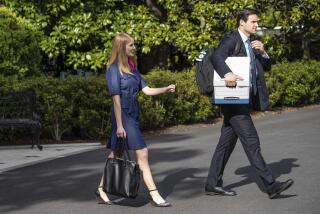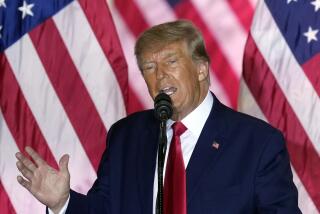Cabinet Officer Testifies at Perjury Trial : Was Lobbied by Deaver on Tax Issue, Shultz Says
- Share via
WASHINGTON — Secretary of State George P. Shultz testified Friday at Michael K. Deaver’s perjury trial that the former White House aide visited him in his State Department office in October, 1985, to lobby on a Puerto Rican tax issue.
Shultz’s testimony contradicted sworn statements by Deaver last year that he never lobbied any U.S. official on that issue other than Treasury Secretary James A. Baker III and his aides.
Deaver, who is charged with five counts of perjury, listened intently with his chin in his palm as Shultz described himself as a personal friend of President Reagan’s former confidant, who resigned from the White House in May, 1985, and started a lucrative lobbying and consulting business.
The secretary of state is the highest-ranking Administration official to testify in the trail, which entered its second month Friday.
A Bit of Humor
Shultz, relaxed and in good humor, initially was asked by court-appointed prosecutor Whitney North Seymour Jr. to tell the jury his occupation.
“Professor on leave from Stanford University,” he replied dryly before agreeing with Seymour that he was the secretary of state.
Deaver is accused of perjuring himself in testimony before a House subcommittee and a federal grand jury investigating his lobbying activities.
Under the Ethics in Government Act, high officials are forbidden to lobby their former agencies for at least a year and for longer periods when their lobbying involves matters that they dealt with personally and substantially when in government.
Deaver was not charged with any direct lobbying violations. His perjury case is expected to go to the jury about mid-December.
Tax Issue Involved
The last count of Deaver’s indictment charges that he lied to grand jurors when he was asked: “Did you yourself have any contacts or conversations relating to the (Section) 936 issue (Puerto Rico) with anybody in the federal government apart from Secretary Baker . . . and the people in the Treasury?”
Deaver replied: “I don’t recall any such discussions.”
Shultz’s testimony seemed damaging to Deaver under the theory that most people would remember a visit to the secretary of state’s ornate office several months earlier. Seymour has charged that Deaver tried to conceal the extent of his lobbying contacts on behalf of U.S. corporations and foreign governments to protect himself from adverse publicity during an investigation into his business affairs.
However, Shultz--under cross-examination by Herbert J. Miller Jr., Deaver’s chief defense attorney--said: “Based on my own experience, I have a very high opinion of his integrity and honesty and truthfulness.”
Did Not Request Action
Shultz, who said his calendar shows that he met with Deaver for 12 minutes, testified that Deaver did not request any action on his part. Deaver simply informed him that he was representing Puerto Rico and favored retention of Section 936 of the Internal Revenue Code, which provided income tax breaks for U.S. companies with investments in Puerto Rico, the secretary said.
Previous witnesses have testified that Deaver was, in fact, not representing Puerto Rico. They say he actually was representing the Smith Barney investment firm, which had clients who would have been affected by any change in that tax code section.
Eventually, the Reagan Administration persuaded Congress to retain the tax incentives on grounds that they would contribute to the economic stability of the Caribbean, despite earlier opposition by Treasury officials.
Seymour tried to counter Shultz’s praise of Deaver by asking him: “Do you know what he told the grand jury?” But Shultz replied: “I have no idea,” and Seymour did not attempt a further question.
More to Read
Sign up for Essential California
The most important California stories and recommendations in your inbox every morning.
You may occasionally receive promotional content from the Los Angeles Times.













